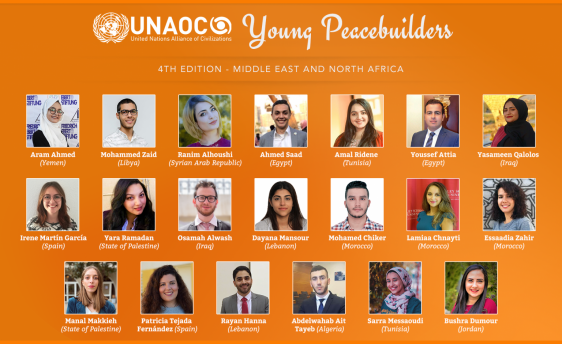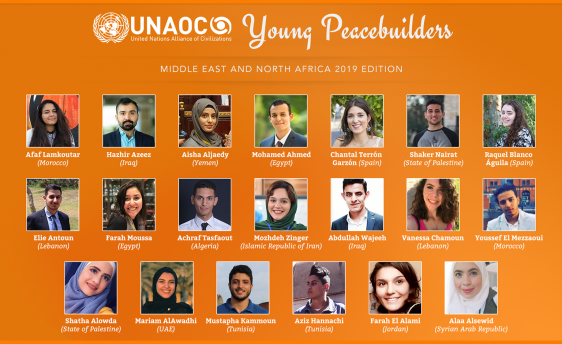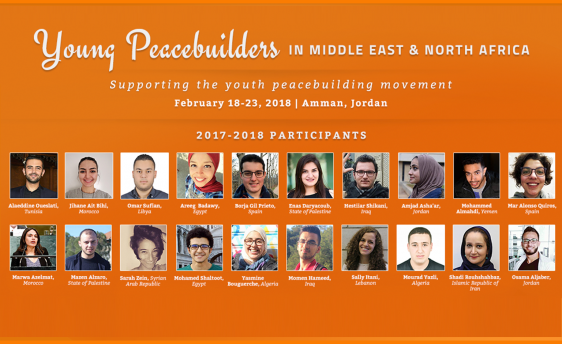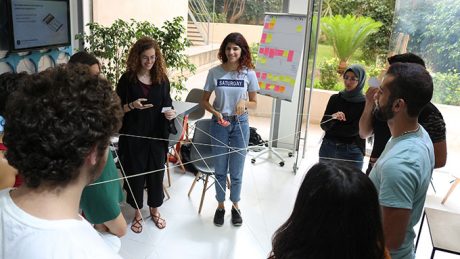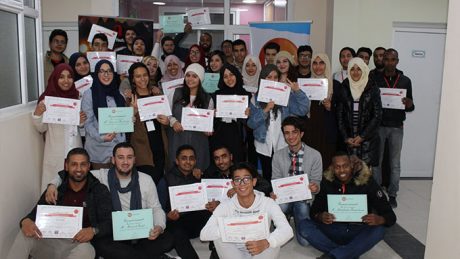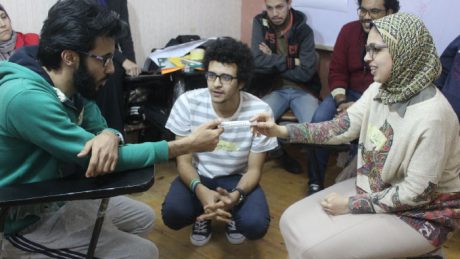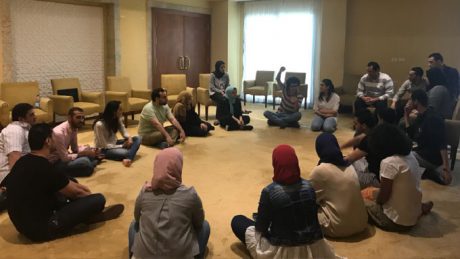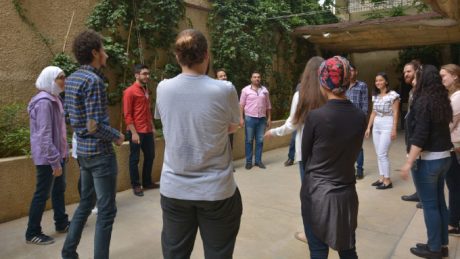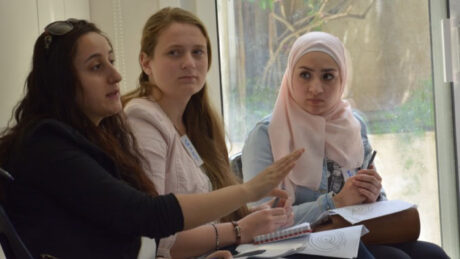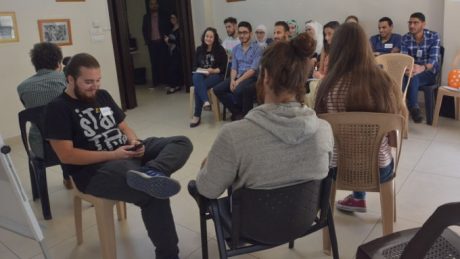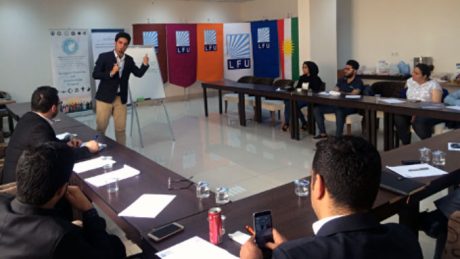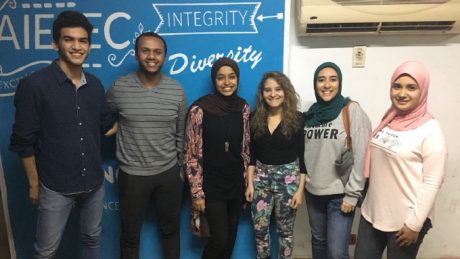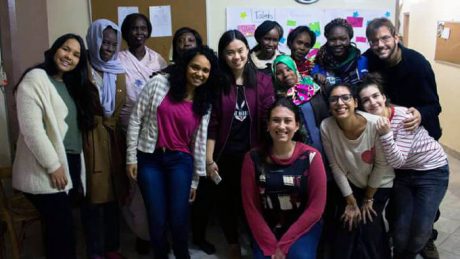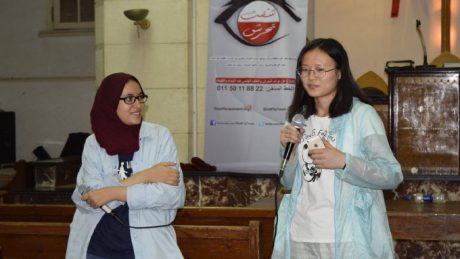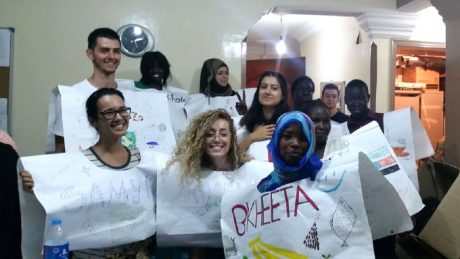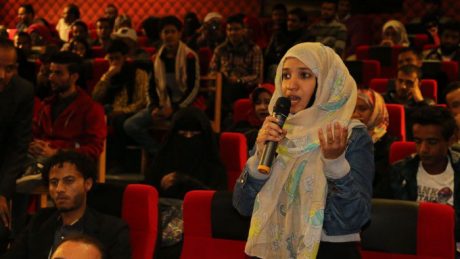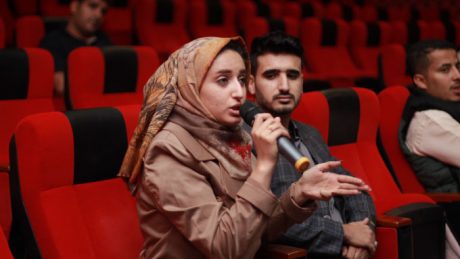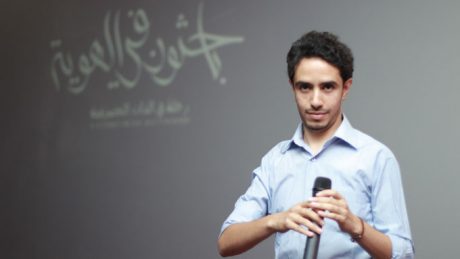Focusing on the region of the Middle East and North Africa, the second, third and fourth editions of the UNAOC Young Peacebuilders programme were launched in 2017, 2019 and 2020, respectively; with the aim of supporting young civil society leaders in gaining competencies to address negative stereotypes, prejudice and polarization (important drivers of violent extremism), while bringing visibility to their actions and projects towards the promotion of diversity and intercultural/interfaith dialogue.
 Funded by AEXCID (Agencia Extremeña de Cooperación Internacional para el Desarrollo) and the second edition implemented in collaboration with Generations for Peace, Young Peacebuilders is an example of a meaningful partnership that strengthens the groundbreaking UN Security Council Resolutions 2250 and 2419 on Youth, Peace and Security which recognize that “young people play an important and positive role in the maintenance and promotion of international peace and security”.
Funded by AEXCID (Agencia Extremeña de Cooperación Internacional para el Desarrollo) and the second edition implemented in collaboration with Generations for Peace, Young Peacebuilders is an example of a meaningful partnership that strengthens the groundbreaking UN Security Council Resolutions 2250 and 2419 on Youth, Peace and Security which recognize that “young people play an important and positive role in the maintenance and promotion of international peace and security”.
THE PARTICIPANTS
For each of the 3 editions UNAOC selected, through a competitive call for applications, 20 young women and men between the ages of 18 to 25 to take part in the programme. The group, balanced in terms of gender and reflecting diverse religious and cultural backgrounds, came from 13 different countries in the MENA region, namely: Algeria, Egypt, Iraq, the Islamic Republic of Iran, Jordan, Lebanon, Libya, Morocco, the State of Palestine, Syria, Tunisia, the United Arab Emirates and Yemen.
THE PROGRAMME
The programme uses blended curriculum and consists out of four phases of learning, to maximize the outcomes that can be achieved through a single one-week face-to-face training and encouraging participants to apply the lessons learned:

Phase 1: Online Engagement
An online platform was created for exchange and learning among participants, supporting participants to come better prepared for the workshop: the network had started forming and collaborating, and the group had basic common references for some key terms and concepts.
Participants were encouraged to start getting to know each other and the programme team in order to foster a positive learning environment and create linkages among the group before meeting in person. They were presented with content and were also challenged to contribute to this content and its understanding by sharing their own experience and exchanging ideas with each other. The participant-friendly methodology kept participants motivated and engaged and connected the content to their own life and experience.
Phase 2: Face-to-face Workshop
The overall aim of the workshop was to consolidate and leverage the learning from the online phase of the programme and use it as a basis for deepening reflection and skills acquisition in the field of peacebuilding, intercultural dialogue and conflict transformation.
Methodology: Experiential learning, using games and interactive methods as a basis to introduce the topics. Each activity was debriefed to stimulate reflection and encourage participants to make sense of the experience, introduce or review concepts, tools and frameworks, and draw conclusions to inform future action.
Main outcomes: Consolidation of the network and creation of personal action plans in which participants outlined specific actions they would take in the following months. Participants were empowered to translate the learning into specific actions that can benefit their organizations and advance intercultural dialogue and peacebuilding in their communities, thus increasing their contribution as agents of peace.
The workshops of the second and third editions of the Young Peacebuilders Program were held in Amman (Jordan) between the 19th and the 23rd of February, 2018; and Mérida (Spain) between the 7th and the 12th of October, 2019. The workshop of the fourth edition, scheduled for March 2020 in Mérida (Spain), has been postponed until further notice due to the health emergency caused by COVID-19.
Phase 3: Applied Learning
Each participant of the programme developed a personal Action Plan in Amman and Mérida, and in the months following the workshop, they were challenged to make it come to life. Participants were encouraged to reinforce and integrate the learning through concrete practice, and to multiply the messages and benefits of their intercultural learning experience.
The participants of the second edition of Young Peacebuilders reached more than 2500 additional persons by organizing step-down activities, while the participants of the third edition are currently implementing their respective action plans.
Phase 4: Results-sharing symposium
During the symposium, Young Peacebuilders had the opportunity to share their experiences, lessons learned, achievements and recommendations with a broad audience of practitioners, UN staff, policymakers, civil society and other experts.
The symposium of the second edition of the second edition of Young Peacebuilders took place in Amman, Jordan on the 20th and the 21st of September 2018; and the symposium of the 3rd and 4th edition was held in Rabat, Morocco on the 13th and 16th of June 2022.
External evaluations were conducted of the Young Peacebuilders editions in MENA (2017-18, 2019, and 2020). They independently concluded that the Young Peacebuilders programme was:
Relevant as it is in line with current international challenges and responding to the needs of participants and their local peacebuilding contexts.
Effective: :thanks to the excellent planning, the synergy between each project phase and the intense support of the trainers, the programme achieved its goal of enhancing the peacebuilding skills of the participants. Despite challenges posed by the pandemic (for 3rd and 4th edition), which resulted in re-designing some of the previously planned learning phases, all learning objectives were achieved as planned.
Efficient: UNAOC utilized minimum resources to realize the intended outcomes and the total cost of the project was lower than other projects of this kind.
Impactful: participants are active agents of change, able to apply the acquired peacebuilding competencies in their own social and organizational contexts.
Sustainable: the participants have demonstrated the ability to cascade the skills they learned to other relevant stakeholders in their communities, achieving the intended multiplier effect. The participants of the 3 editions reached more than 7,000 direct beneficiaries by organizing step-down activities, reaching in turn, approximately 250,000 indirect beneficiaries.
Gender-sensitive: participants successfully incorporated a gender perspective into their community projects

